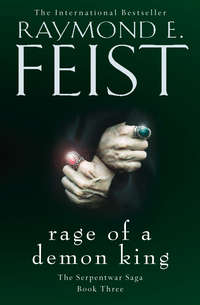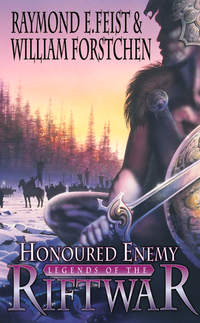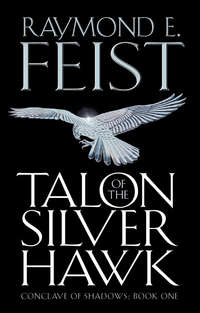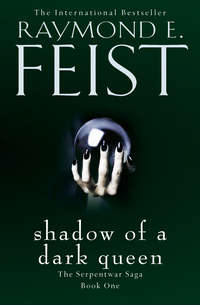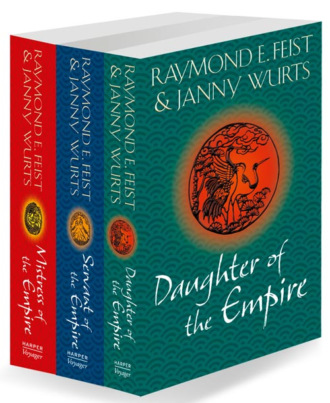
Полная версия
The Complete Empire Trilogy: Daughter of the Empire, Mistress of the Empire, Servant of the Empire
The maids waited upon their mistress. Seated upon cushions in the chamber she still considered her father’s, Mara opened her eyes and said, ‘I am ready.’
But in her heart she knew she was not prepared for her marriage to the third son of the Anasati, and never would be. With her hands clenched nervously together, she endured as her maids began the tortuous process of combing out her hair and binding it with threads and ribbons into the traditional bride’s headdress. The hands of the women worked gently, but Mara could not settle. The twist and the tug as each lock was secured made her want to squirm like a child.
As always, Nacoya seemed to read her mind. ‘Mistress, the eye of every guest will be upon you this day, and your person must embody the pride of Acoma heritage.’
Mara closed her eyes as if to hide. Confusion arose like an ache in the pit of her stomach. The pride of Acoma heritage had enmeshed her in circumstances that carried her deeper and deeper into nightmare; each time she countered a threat, another took its place. She wondered again whether she had acted wisely in selecting Buntokapi as husband. He might be influenced more easily than his well-regarded brother Jiro, but he also might prove more stubborn. If he could not be controlled, her plans for the resurgence of Acoma pre-eminence could never be achieved. Not for the first time, Mara stilled such idle speculations: the choice was made. Buntokapi would be Lord of the Acoma. Then she silently amended that: for a time.
‘Will the Lady turn her head?’ Mara obeyed, startled by the warmth of the maid’s hand upon her cheek. Her own fingers were icy as she considered Buntokapi and how she would deal with him. The man who would take her father’s place as Lord of the Acoma had none of Lord Sezu’s wisdom or intelligence, nor had he any of Lano’s grace, or charm, or irresistible humour. In the few formal occasions Mara had observed Buntokapi since his arrival for the wedding, he had seemed a brute of a man, slow to understand subtlety and obvious in his passions. Her breath caught, and she forestalled a shudder. He was only a man, she reminded herself; and though her preparation for temple service has caused her to know less of men than most girls her age, she must use her wits and body to control him. For the great Game of the Council, she would manage the part of wife without love, even as had countless women of great houses before her.
Tense with her own resolve, Mara endured the ministrations of the hairdressers while the bustle and shouts through the thin paper of the screens indicated that servants prepared the great hall for the ceremony. Outside, needra bawled, and wagons rolled, laden with bunting and streamers. The garrison troops stood arrayed in brightly polished full armour, their weapons wrapped with strips of white cloth to signify the joy of their mistress’s coming union. Guests and their retinues crowded the roadway, their litters and liveried servants a sea of colour against the baked grass of the fields. Slaves and workers had been granted the day off for the festivities, and their laughter and singing reached Mara where she sat, chilled and alone with her dread.
The maids smoothed the last ribbon and patted the last gleaming tresses into place. Beneath coiled loops of black hair, Mara seemed a figure of porcelain, her lashes and brows as fine as a temple painter’s masterpiece. ‘Daughter of my heart, you have never looked so lovely,’ observed Nacoya.
Mara smiled mechanically and rose, while dressers slipped the simple white robe from her body and dusted her lightly with a powder to keep her dry during the long ceremony. Others readied the heavy embroidered silk gown reserved for Acoma brides. As the wrinkled old hands of the women smoothed the undergarment over her hips and flat stomach, Mara bit her lip; come nightfall, the hands of Buntokapi would touch her body anywhere he pleased. Without volition she broke into a light sweat.
‘The day grows warm,’ muttered Nacoya. A knowing gleam lit her eyes as she added a little extra powder where Mara would need it. ‘Kasra, fetch your mistress a cool drink of sa wine. She looks pale, and the excitement of the wedding is not yet begun.’
Mara drew an angry breath. ‘Nacoya, I am able to manage well enough without wine.’ She paused, frustrated, as her women hooked the laces at her waist and lower chest, temporarily constricting her breath. ‘Besides, I’m sure Bunto will drink enough for both of us.’
Nacoya bowed with irritating formality. ‘A slight flush to your face becomes you, Lady. But husbands don’t care for perspiration.’ Mara chose to ignore Nacoya’s cross words. She knew the old nurse was worried for the child she loved above all others.
Outside, the busy sounds told Mara that her household scrambled to finish the last-minute tasks. The august of the Empire and nearly overwhelming list of invited guests would gather in the great hall, seated according to rank. Since those of highest rank would be shown to their cushions last, the arrangement of the guests became a complex and lengthy affair that began well before dawn. Tsurani weddings occurred during the morning, for to complete so important a union in the waning part of the day was believed to bring ill luck to the couple. This required guests of modest rank to present themselves at the Acoma estate before dawn, some as early as four hours before sunrise. Musicians and servants with refreshments would entertain those seated first, while the priest of Chochocan sanctified the Acoma house. By now they would be donning their high robes of office, while out of sight a red priest of Turakamu would slaughter the needra calf.
The maids lifted the overrobe, with its sleeves sewn with shatra birds worked in rare gold. Mara gratefully turned her back. As attendants arranged her bows, she was spared the sight of Nacoya checking each last detail of the costume. The old nurse had been on edge since Mara chose to grant Buntokapi power over the Acoma. That Mara had done so with long-range hopes in mind did nothing to comfort Nacoya, what with Anasati warriors encamped in the barracks, and one of the Acoma’s most vigorous enemies living in style in the best guest chambers in the house. And with his brassy voice and artless manners, Buntokapi offered no reassurance to a servant who would shortly be subject to his every whim. And she herself would also, Mara remembered with discomfort. She tried to imagine being in bed with the bullnecked boy without shuddering, but could not.
Cued by a servant’s touch, Mara sat while the jewelled ceremonial sandals were laced onto her feet. Other maids pressed shell combs set with emeralds into her headdress. Restive as the needra calf being perfumed for sacrifice – so that Turakamu would turn his attentions away from those at the wedding – the girl called for a minstrel to play in her chambers. If she must endure through the tedium of dressing, at least music might keep her from exhausting herself with thought. If fate brought her trouble through this marriage to Buntokapi, she would find out soon enough. The musician was led in blindfolded; no man might look upon the bride until she began her procession to the wedding. He sat and picked out a soothing melody on his gikoto, the five-string instrument that was the mainstay of Tsurani composition.
When the last laces and buttons had been fastened, and the final string of pearls looped to her cuffs, Mara arose from her cushions. Blindfolded slaves bearing her ceremonial litter were led into the chamber, and Mara climbed into the open palanquin crafted solely for Acoma weddings. The frame was wound with flowers and koi vines for luck, and the bearers wore garlands in their hair. As they lifted the litter to their shoulders, Nacoya stepped between them and lightly kissed Mara on the forehead. ‘You look lovely, my Lady – as pretty as your own mother on the morning she wed Lord Sezu. I know she would have been proud to see you, were she alive this day. May you find the same joy in marriage as she, and be blessed with children to carry on the Acoma name.’
Mara nodded absently. As serving women stepped forward to lead her bearers through the screen, the minstrel she had summoned faltered in his singing and awkwardly fell silent. With a frown, the girl berated herself for carelessness. She had done the musician a discourtesy by leaving him without praise. As the litter moved from the chamber into the first empty connecting hall, Mara quickly dispatched Nacoya to give the man a token, some small gift to restore his pride. Then, wrapping her fingers tightly together to hide their shaking, she resolved to be more alert. A great house did not thrive if its mistress concerned herself with large matters only. Most often the ability to handle the petty details of life comprised an attitude that allowed one to discover the path to greatness; or so Lord Sezu had admonished when Lano had neglected his artisans for extra drill with the warriors.
Mara felt a strange detachment. The distant bustle of preparations and the arrival of guests lent a ghostly aspect to the corridors emptied for the passage of her litter. Wherever she looked she saw no one, yet the presence of people filled the air. In isolation she reached the main corridor and moved out of the estate house, into the small garden set aside for meditation. There Mara would pass an hour alone in contemplation, as she prepared to leave her girlhood and accept the role of woman and wife. Acoma guards in elaborate ceremonial armour stood watch around the garden, to protect, and to ensure the Lady would suffer no interruption. Unlike the bearers, they wore no blindfolds, but rather stood facing the walls, straining their hearing to the limit, alert, but not tempting ill luck by gazing upon the bride.
Mara turned her mind away from the coming ceremony, seeking instead to find a moment of calm, some hint of the serenity she had known in the temple. She settled gracefully to the ground, adjusting her gown as she settled on the cushions left for her. Bathed in the pale gold of early morning, she watched the play of water over the rim of the fountain. Droplets formed and fell, each separate in its beauty until it shattered with a splash into the pool beneath. I am like those droplets, thought the girl. Her efforts throughout life would, in the end, blend with the lasting honour of the Acoma; and whether she knew happiness or misery as the wife of Buntokapi would not matter at all when her days ended, so long as the sacred natami remained in the glade. And so long as the Acoma were accorded their rightful place in the sun, unshadowed by any other house.
Bending her head in the dew-bright stillness, Mara prayed earnestly to Lashima, not for the lost days of her girlhood, or for the peace she had desired in temple service. She asked instead for the strength to accept the enemy of her father as husband, that the name Acoma might rise once again in the Game of the Council.
Конец ознакомительного фрагмента.
Текст предоставлен ООО «ЛитРес».
Прочитайте эту книгу целиком, купив полную легальную версию на ЛитРес.
Безопасно оплатить книгу можно банковской картой Visa, MasterCard, Maestro, со счета мобильного телефона, с платежного терминала, в салоне МТС или Связной, через PayPal, WebMoney, Яндекс.Деньги, QIWI Кошелек, бонусными картами или другим удобным Вам способом.


